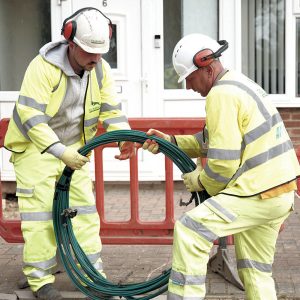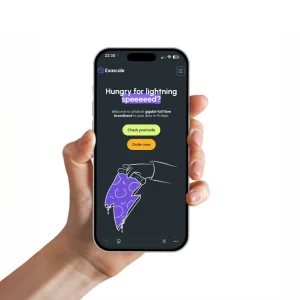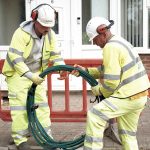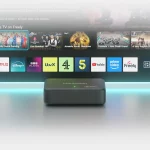Sponsored Links
BT Launch UK Campaign to Stop Copper Broadband and Phone Cable Theft
Posted: 26th Jul, 2010 By: MarkJ
 BT Openreach, which is responsible for ensuring that all rival operators have equality of access to BT's local network (e.g. LLU - Local Loop Unbundling), has today launch a new initiative against cable theft called SmartWater; an invisible solution that can be used to forensically "tag" metal thieves and protect vital UK telecoms infrastructure.
BT Openreach, which is responsible for ensuring that all rival operators have equality of access to BT's local network (e.g. LLU - Local Loop Unbundling), has today launch a new initiative against cable theft called SmartWater; an invisible solution that can be used to forensically "tag" metal thieves and protect vital UK telecoms infrastructure.Regular readers will already know that BT has often become the victim of thieves, driven by the recent surge in scrap copper prices, who typically brake into crucial exchanges or junction houses with the aim of stealing its valuable cable. Last year saw an increase of 9% in incidents of deliberate attacks on the BT network
Unfortunately that same copper cable is also used to connect most UK homes and businesses with vital telephone and broadband internet services. It's theft often results in significant service outages, lost revenue for businesses and costs BT millions of pounds each year to repair. £770 million is the estimated cost, across all industries in the UK, for metal theft
BT's almost robotic sounding Metal Theft Taskforce (MTT) today began a major fight back with the roll-out of innovative technology developed by scientists at British company SmartWater. The operation is supported by British Transport Police (BTP) and uses forensic marking and GPS tracking technologies.
Bernie Auguste, BT Openreach's Head of Security, said:
"From now on, any criminal who targets the BT network risks being invisibly ‘tagged’ with SmartWater, meaning that the police can trace them, and any stolen cable or equipment, back to the scene of the crime. Cable theft affects not only us as a business, but the millions of people who rely on access to phones and broadband across the UK, and with the help of this technology we’re fighting back."
"From now on, any criminal who targets the BT network risks being invisibly ‘tagged’ with SmartWater, meaning that the police can trace them, and any stolen cable or equipment, back to the scene of the crime. Cable theft affects not only us as a business, but the millions of people who rely on access to phones and broadband across the UK, and with the help of this technology we’re fighting back."
The system uses a sophisticated forensic marking liquid that is unique to a particular location. It will be used to mark the outer shell and inner core of BT's cable, along with tools and other equipment. This will allow police to irrefutably identify where any stolen items have come from.
In hot-spot areas SmartWater trap devices will also be deployed to capture criminals red-handed. Any thieves who target Openreach property face being sprayed with the liquid, meaning they will carry evidence of their crime on their skin and clothing wherever they go (we guess they threw out our alternative idea of using RoboCop style automated machine gun turrets).
Detective Inspector Robin Conway, from the British Transport Police, said:
"Cable and metal theft is high on BTP's agenda due to the disruption and economic effect it has on businesses and communities. Anyone arrested for metal theft will be examined for traces of SmartWater. A search will be made of the person’s house and any property, including vehicles with traces of SmartWater on them, is likely to be seized by police. Scrap metal dealers will also be visited regularly to ensure they are assisting British Transport Police in identifying criminals attempting to sell stolen metal."
"Cable and metal theft is high on BTP's agenda due to the disruption and economic effect it has on businesses and communities. Anyone arrested for metal theft will be examined for traces of SmartWater. A search will be made of the person’s house and any property, including vehicles with traces of SmartWater on them, is likely to be seized by police. Scrap metal dealers will also be visited regularly to ensure they are assisting British Transport Police in identifying criminals attempting to sell stolen metal."
Teams from SmartWater, BT Security and British Transport Police will also be working with scrap merchants to check for traces of the forensic solution. This will directly target the thieves’ supply chain, making it more and more difficult to sell on stolen goods without detection.
In addition to rolling out SmartWater, Openreach is stepping up mobile patrolling of network sites, introducing new locks for manholes, and working closely with local police forces on dedicated ‘sting’ operations to target metal thieves. Last year, BT worked with Police to achieve over 200 arrests.
The use of this technology by Openreach in North London is apparently already achieving results by reducing the number of network attacks. The system is now being deployed across the UK and we hope it will achieve its aims and help keep us all connected.
Search ISP News
Search ISP Listings
Search ISP Reviews
Latest UK ISP News








Cheap BIG ISPs for 100Mbps+
150,000+ Customers | View More ISPs
Cheapest ISPs for 100Mbps+
Modest Availability | View More ISPs
Latest UK ISP News
Helpful ISP Guides and Tips
Sponsored Links
The Top 15 Category Tags
- FTTP (6851)
- BT (3900)
- Politics (3096)
- Business (2792)
- Openreach (2680)
- Building Digital UK (2523)
- Mobile Broadband (2498)
- FTTC (2148)
- Statistics (2145)
- 4G (2113)
- Virgin Media (2040)
- Ofcom Regulation (1790)
- 5G (1755)
- Fibre Optic (1610)
- Wireless Internet (1605)
Sponsored
Copyright © 1999 to Present - ISPreview.co.uk - All Rights Reserved - Terms , Privacy and Cookie Policy , Links , Website Rules































